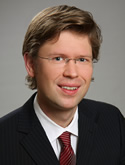The European Hematology Association (EHA)-ASH Research Exchange Award, established in 2006, is the first award program to come from an EHA and ASH partnership. This program is a groundbreaking award for both clinical and laboratory-based researchers in training or early in their careers. The EHA-ASH Research Exchange Award offers them an opportunity to experience research in a different environment and to establish new collaborations with established scientists from around the world. The 2010 EHA-ASH Research Exchange Award recipient is Ingmar Bruns, MD.
Dr. Ingmar Bruns comes from the University of Düsseldorf in Germany where he is a resident physician and research scientist in the Department of Hematology, Oncology, and Clinical Immunology. Dr. Bruns first got involved with experimental research during his time in medical school, where he tried to investigate the effect of hyperthermia on the immunogenicity of tumor cells and subsequent T-cell activation. After graduation, he started as a resident in hematology and found an interest in hematopoietic stem cell biology. At that time, the lab he was in focused mainly on the molecular characterization of human stem and progenitor cells using microarrays. The experiments in the laboratory led to the detection of the receptors for the hypothalamic peptides orexin A and B on hematopoietic stem cells, which provide the basis for Dr. Bruns’ project, “The role of the hypothalamic peptides orexin A and B and their receptors in the regulation of hematopoietic stem cell behavior,” which he will be taking to the laboratory of Paul Frenette, MD, at Mount Sinai School of Medicine, in New York, NY. Dr. Bruns sought the mentorship of Dr. Frenette for his contributions to the field of neural control of hematopoietic stem cell behavior. Dr. Frenette’s scientific approach and the methodology utilized in his laboratory provide an ideal environment for Dr. Bruns’ research interests and further career development in addition to his home mentor, Dr. Rainer Haas, at the University of Düsseldorf, Germany. Participating in the award program will enable Dr. Bruns to return to Düsseldorf to start an independent junior research group — a goal of his which requires previous research experience abroad for successful application.
ASH and EHA are pleased to support the research of this promising young investigator through this unique award.

